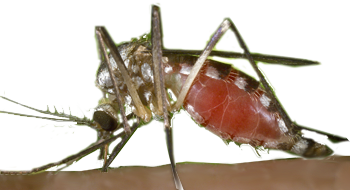
Ae. triseriatus is an aggressive daytime-biting mosquito, especially in or near infested woods.
La Crosse encephalitis virus (LACV) is transmitted to humans by the bite of an infected mosquito. Most cases of LACV disease occur in the upper Midwestern and mid-Atlantic and southeastern states (see map). Many people infected with LACV have no apparent symptoms. Among people who become ill, initial symptoms include fever, headache, nausea, vomiting, and tiredness. Some of those who become ill develop severe neuroinvasive disease (disease that affects the nervous system). Severe LACV disease often involves encephalitis (an inflammation of the brain) and can include seizures, coma, and paralysis. Severe disease occurs most often in children under the age of 16. In rare cases, long-term disability or death can result from La Crosse encephalitis. There is no specific treatment for LACV infection– care is based on symptoms. If you or a family member have symptoms of severe LACV disease or any symptoms causing you concern, consult a healthcare provider for proper diagnosis.
The best way to reduce your risk of infection with LACV or other mosquito-borne viruses is to prevent mosquito bites. Use insect repellent, wear long sleeves, long pants and socks or even stay indoors while mosquitoes are most active. The mosquitoes that spread LACV are most active during the daytime.
General Information
- Page last reviewed: April 11, 2016
- Page last updated: April 11, 2016
- Content source:


 ShareCompartir
ShareCompartir